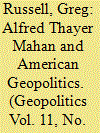|
|
|
Sort Order |
|
|
|
Items / Page
|
|
|
|
|
|
|
| Srl | Item |
| 1 |
ID:
071315


|
|
|
|
|
| Publication |
2006.
|
| Summary/Abstract |
Debate about the goals of American foreign policy at the end of the twentieth century, especially that thread differentiating "conservative" from "neoconservative" perspectives, might profit by revisiting the debate over American expansion at the end of the nineteenth century. "I am an imperialist," Captain Alfred Thayer Mahan once remarked, "simply because I am not isolationist." This paper explores the connection between Mahan's defense of imperialism-often couched in terms of national interest and balance of power- and the norms of American power in world politics. The will-to-power behind American expansion and involvement, a formidable pillar in Mahan's realism, coexisted (often uneasily) with the affirmation of national purpose, a less formidable but still important part of Mahan's idealism. Mahan's strong conservative inclinations in politics were matched by a willingness to employ the tools of realism-particularly traditional diplomatic methods-as a way to uphold historic national goals and moral vision in American foreign policy. Far from seeing an irremediable conflict between the counsels of realism and limited moral gains in foreign policy, Mahan understood that governments are not immune from certain overall constraints. Seldom if ever could American actions abroad be defended by arguing solely for the maintenance or increase of national power.
|
|
|
|
|
|
|
|
|
|
|
|
|
|
|
|
| 2 |
ID:
073687


|
|
|
|
|
| Publication |
2006.
|
| Summary/Abstract |
The central argument of this article is that Theodore Roosevelt's worldview was formed at the intersection of geopolitics and cosmopolitan morality. The intellectual roots of his political and foreign policy convictions contributed to a diplomatic style for which the conventional labels of realism or idealism are both inadequate and misleading. Contrary to the stereotypical caricature of Roosevelt as an American architect of realpolitik, or ruthless man on horseback, he held a complex set of beliefs about international relations that transcends familiar academic theorising about either power politics or universal principles of morality. Neither the vision of international anarchy, nor the calculation of state capabilities, do justice to Roosevelt's sense of the interplay between values and power in foreign policy conduct. Moral principles, Roosevelt claimed, help make clear the inescapable tension between ideals and reality. The moral problem persists, he thought, because foreign policy involves political choices obscured by faulty perception, controlled by national interests, and complicated by multiple purposes and goals. Roosevelt's more nuanced worldview underscores the need for a revised historiography of international relations, one that builds upon the recognition that realists and idealists were never divided into clearly-identifiable camps either before or after the First World War.
|
|
|
|
|
|
|
|
|
|
|
|
|
|
|
|
|
|
|
|
|